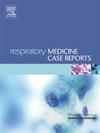Reduced tracheal stenosing effect of nintedanib in a patient with scarred posttraumatic tracheal stenosis and airflow limitation - a case report
IF 0.7
Q4 RESPIRATORY SYSTEM
引用次数: 0
Abstract
Introduction
Nintedanib is a tyrosine kinase inhibitor and has been approved for the treatment of idiopathic pulmonary fibrosis (IPF) since 2020. In Clinical trials, the antifibrotic effect of nintedanib was shown.
Case
A 60-year-old female medical assistant, infected with COVID-19 in 10/2020, experienced a complicated course of disease leading to tracheal stenosis. Various interventions, including stent placements and tracheal surgeries, were performed. Due to recurrent restenosis, the patient was treated with nintedanib, a tyrosine kinase inhibitor used in idiopathic pulmonary fibrosis. The treatment spanned 306 days, during which the patient showed stability in pulmonary function. Nintedanib demonstrated a potential anti-inflammatory effect, reducing the frequency of interventions and prolonging stent-free intervals. The results suggest possible efficacy of nintedanib in managing scar-related granulation tissue, highlighting its potential in treating tracheal stenosis.
Conclusion
This case shows a decreased need for interventions, and the longer duration of stent placement may suggest a potential role for nintedanib in diminishing hypertrophic scarring, possibly through an anti-inflammatory effect. Further exploration of this potential in additional clinical trials would be valuable.
尼达尼布对创伤后瘢痕气管狭窄和气流受限患者的气管狭窄效果降低- 1例报告
尼达尼布是一种酪氨酸激酶抑制剂,自2020年以来已被批准用于治疗特发性肺纤维化(IPF)。在临床试验中,尼达尼布显示出抗纤维化作用。病例一名60岁女性医务助理,于2020年10月感染COVID-19,经历了复杂的病程,导致气管狭窄。进行了各种干预措施,包括支架放置和气管手术。由于复发性再狭窄,患者接受了尼达尼布治疗,这是一种用于特发性肺纤维化的酪氨酸激酶抑制剂。治疗时间为306天,期间患者肺功能稳定。尼达尼布显示出潜在的抗炎作用,减少干预频率并延长无支架间隔。结果提示尼达尼布在疤痕相关肉芽组织管理方面可能有效,强调其治疗气管狭窄的潜力。结论:该病例表明干预需求减少,支架放置时间延长可能表明尼达尼布在减少增生性瘢痕形成方面的潜在作用,可能是通过抗炎作用。在其他临床试验中进一步探索这种潜力将是有价值的。
本文章由计算机程序翻译,如有差异,请以英文原文为准。
求助全文
约1分钟内获得全文
求助全文
来源期刊

Respiratory Medicine Case Reports
RESPIRATORY SYSTEM-
CiteScore
2.10
自引率
0.00%
发文量
213
审稿时长
87 days
 求助内容:
求助内容: 应助结果提醒方式:
应助结果提醒方式:


